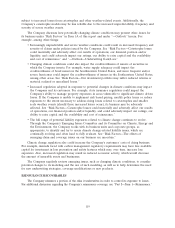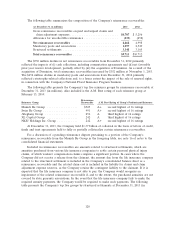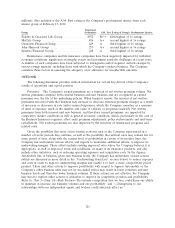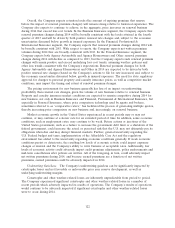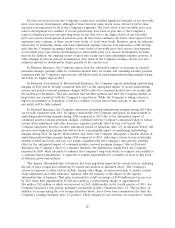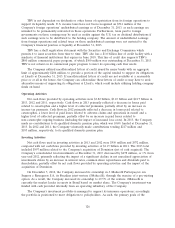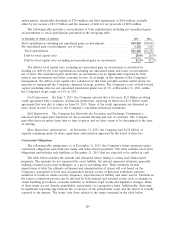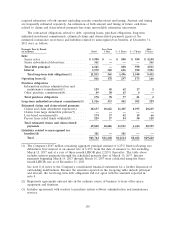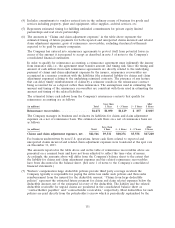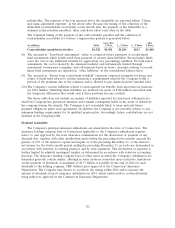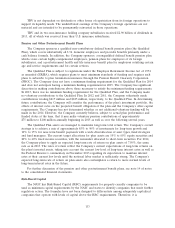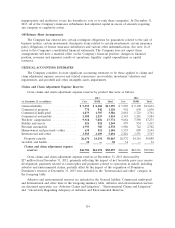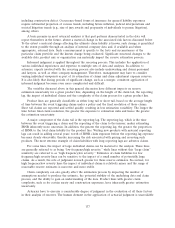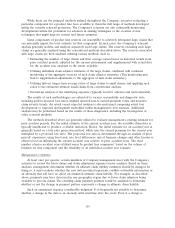Travelers 2013 Annual Report Download - page 139
Download and view the complete annual report
Please find page 139 of the 2013 Travelers annual report below. You can navigate through the pages in the report by either clicking on the pages listed below, or by using the keyword search tool below to find specific information within the annual report.
authorization, shareholder dividends of $734 million and debt repayments of $500 million, partially
offset by net income of $3.67 billion and the issuance of debt for net proceeds of $494 million.
The following table provides a reconciliation of total capitalization excluding net unrealized gains
on investments to total capitalization presented in the foregoing table.
(at December 31, dollars in millions) 2013 2012
Total capitalization excluding net unrealized gains on investments ............. $29,820 $28,652
Net unrealized gain on investments, net of taxes .......................... 1,322 3,103
Total capitalization .............................................. $31,142 $31,755
Debt-to-total capital ratio ......................................... 20.4% 20.0%
Debt-to-total capital ratio excluding net unrealized gains on investments ....... 21.3% 22.2%
The debt-to-total capital ratio excluding net unrealized gain on investments is calculated by
dividing (a) debt by (b) total capitalization excluding net unrealized gains and losses on investments,
net of taxes. Net unrealized gains and losses on investments can be significantly impacted by both
interest rate movements and other economic factors. Accordingly, in the opinion of the Company’s
management, the debt-to-total capital ratio calculated on this basis provides another useful metric for
investors to understand the Company’s financial leverage position. The Company’s ratio of debt-to-total
capital (excluding after-tax net unrealized investment gains) was 21.3% at December 31, 2013, within
the Company’s target range of 15% to 25%.
Credit Agreement. On June 7, 2013, the Company entered into a five-year, $1.0 billion revolving
credit agreement with a syndicate of financial institutions, replacing its three-year $1.0 billion credit
agreement that was due to expire on June 10, 2013. Terms of the credit agreement are discussed in
more detail in note 8 of notes to the Company’s consolidated financial statements.
Shelf Registration. The Company has filed with the Securities and Exchange Commission a
universal shelf registration statement for the potential offering and sale of securities. The Company
may offer these securities from time to time at prices and on other terms to be determined at the time
of offering.
Share Repurchase Authorization. At December 31, 2013, the Company had $4.76 billion of
capacity remaining under its share repurchase authorization approved by the board of directors.
Contractual Obligations
The following table summarizes, as of December 31, 2013, the Company’s future payments under
contractual obligations and estimated claims and claim-related payments. The table excludes short-term
obligations and includes only liabilities at December 31, 2013 that are expected to be settled in cash.
The table below includes the amount and estimated future timing of claims and claim-related
payments. The amounts do not represent the exact liability, but instead represent estimates, generally
utilizing actuarial projections techniques, at a given accounting date. These estimates include
expectations of what the ultimate settlement and administration of claims will cost based on the
Company’s assessment of facts and circumstances known, review of historical settlement patterns,
estimates of trends in claims severity, frequency, legal theories of liability and other factors. Variables in
the reserve estimation process can be affected by both internal and external events, such as changes in
claims handling procedures, economic inflation or deflation, legal trends and legislative changes. Many
of these items are not directly quantifiable, particularly on a prospective basis. Additionally, there may
be significant reporting lags between the occurrence of the policyholder event and the time it is actually
reported to the insurer. The future cash flows related to the items contained in the table below
129


